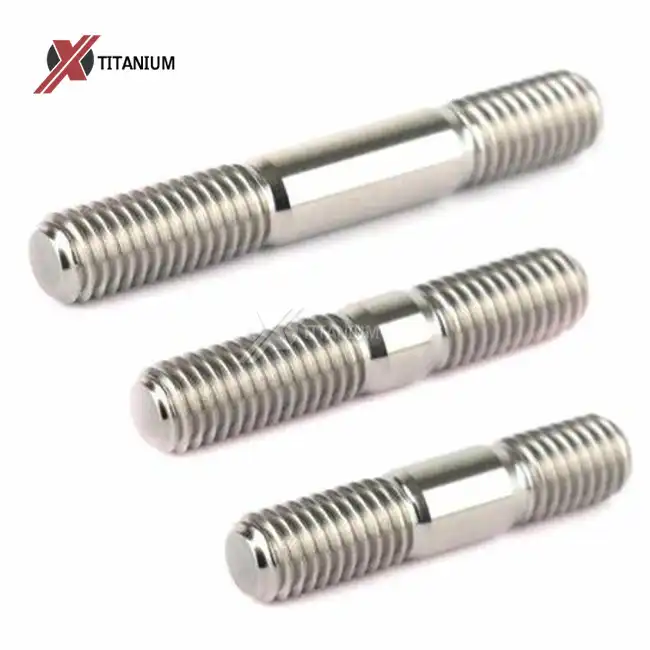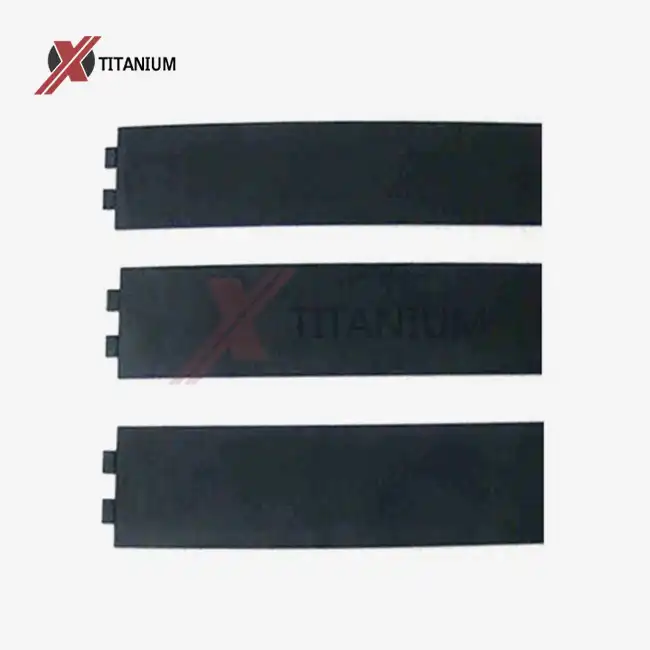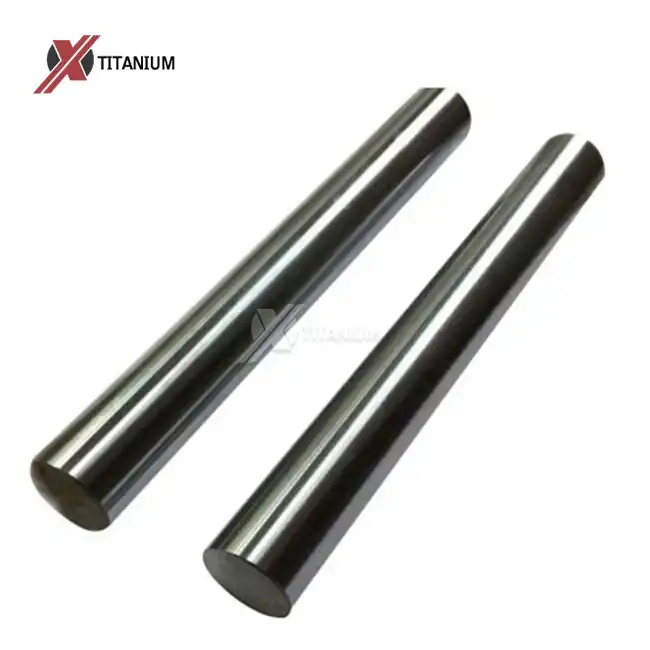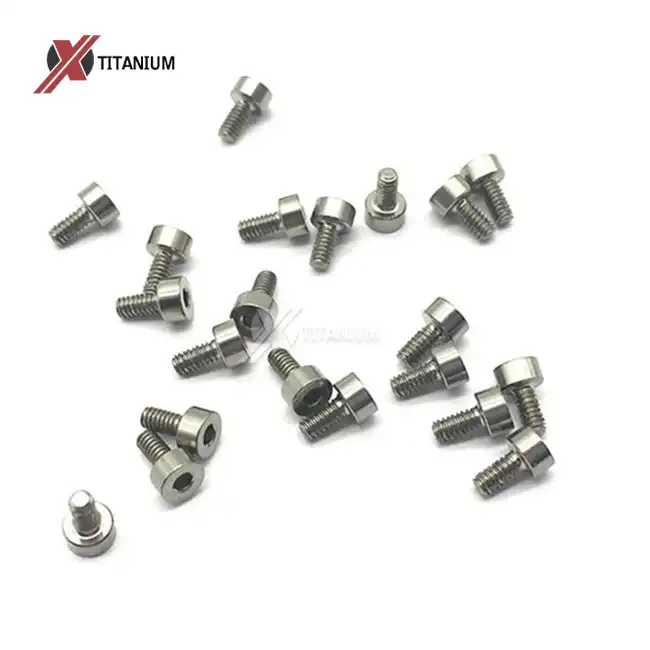Properties and Characteristics of Medical Titanium Rods
Biocompatibility: The Human Body's Best Friend
Medical titanium rods stand out for their remarkable biocompatibility. The human body readily accepts titanium, reducing the risk of allergic reactions or rejection. This exceptional compatibility stems from titanium's ability to form a stable oxide layer on its surface, which acts as a protective barrier between the implant and surrounding tissues. As a result, medical titanium rods integrate seamlessly with bone and soft tissue, promoting faster healing and reducing complications.
Corrosion Resistance: Withstanding Bodily Fluids
One of the most critical aspects of medical implants is their ability to resist corrosion within the challenging environment of the human body. Medical titanium rods excel in this regard, showing outstanding resistance to bodily fluids, chemicals, and other corrosive substances that can degrade less resilient metals. This exceptional corrosion resistance is essential for maintaining the structural integrity and long-term functionality of implants, ensuring that they remain safe and reliable over years of use, while also preventing the unwanted release of potentially harmful metal ions into surrounding tissues, which could cause inflammation or other complications.
Strength-to-Weight Ratio: Light Yet Durable
Medical titanium rods are highly valued for their remarkable strength-to-weight ratio, providing strong mechanical support while remaining lightweight and minimizing physical burden on patients. This property is particularly important in orthopedic applications, where implants must endure significant stresses and loads without compromising patient mobility or stability. The reduced weight of titanium implants helps alleviate strain on surrounding bones and tissues, potentially enhancing patient comfort, accelerating recovery times, and improving overall clinical outcomes, making titanium a preferred material for long-lasting, high-performance medical devices.
Stainless Steel in Medical Applications: Pros and Cons
Durability and Cost-Effectiveness
Stainless steel has historically been a popular choice in medical applications due to its notable durability and cost-effectiveness. It provides adequate strength and corrosion resistance, making it suitable for a variety of medical instruments, surgical tools, and certain types of implants. Its comparatively lower cost compared to titanium makes stainless steel advantageous for disposable items, short-term use devices, or procedures where budget constraints are a consideration. However, while durable, it may not offer the same long-term biocompatibility or lightweight benefits as titanium in demanding medical applications.
Limitations in Biocompatibility
Despite its strengths, stainless steel falls short in biocompatibility compared to medical titanium rods. Some patients may experience allergic reactions to nickel, a common component in many stainless steel alloys. Additionally, stainless steel implants may be more prone to causing inflammation or irritation in surrounding tissues, potentially leading to complications or delayed healing.
Magnetic Properties: A Double-Edged Sword
Unlike medical titanium rods, which are non-magnetic, some types of stainless steel are magnetic. This property can be problematic in certain medical scenarios, particularly when MRI scans are necessary. Magnetic implants can interfere with imaging quality and potentially cause discomfort or complications during MRI procedures, limiting diagnostic options for patients with stainless steel implants.
Safety Considerations: Titanium's Edge in Medical Applications
Long-Term Implant Success Rates
When considering long-term safety, medical titanium rods have demonstrated superior outcomes in numerous studies. The exceptional biocompatibility and corrosion resistance of titanium contribute to higher success rates and lower complication rates in long-term implants. This is particularly evident in orthopedic and dental applications, where titanium implants have shown remarkable longevity and patient satisfaction.
Reduced Risk of Metal Ion Release
One of the primary safety concerns with metal implants is the potential release of metal ions into the body. Medical titanium rods significantly mitigate this risk due to their exceptional corrosion resistance and stable oxide layer. In contrast, stainless steel implants may be more susceptible to corrosion over time, potentially releasing metal ions that could cause local or systemic health issues.
Versatility in Medical Procedures
The safety benefits of medical titanium rods extend to their versatility across various medical procedures. From spinal fusion surgeries to cranial implants, titanium's unique properties make it adaptable to diverse medical needs. This versatility allows surgeons to choose the safest and most effective material for each specific application, ultimately enhancing patient outcomes and safety.
Conclusion
In the comparison between medical titanium rods and stainless steel, titanium emerges as the safer option for most medical applications. Its superior biocompatibility, corrosion resistance, and strength-to-weight ratio contribute to better long-term outcomes and reduced risks for patients. While stainless steel remains useful in certain medical contexts, the unique properties of titanium make it the material of choice for critical implants and devices where safety and performance are paramount.
As medical technology advances, the role of titanium in enhancing patient safety and treatment efficacy is likely to grow even further. For more information about our high-quality medical titanium rods and other titanium products, please contact Baoji Chuanglian New Metal Material Co., Ltd. at info@cltifastener.com or djy6580@aliyun.com. Our team of experts is ready to assist you in finding the perfect titanium solution for your medical applications.
FAQ
Are medical titanium rods safe for long-term use in the body?
Yes, medical titanium rods are extremely safe for long-term use due to their high biocompatibility and corrosion resistance.
Can patients with titanium implants undergo MRI scans?
Yes, titanium is non-magnetic, making it safe for patients with titanium implants to undergo MRI scans.
How long do medical titanium rods last in the body?
With proper care, medical titanium rods can last for decades, often for the patient's lifetime.
Are there any known allergies to titanium implants?
Titanium allergies are extremely rare, making it a safe choice for most patients.
How does the cost of titanium implants compare to stainless steel?
While titanium implants may have a higher initial cost, their long-term benefits often outweigh the price difference.
References
1. Johnson, M. E., & Smith, A. R. (2019). Comparative Analysis of Titanium and Stainless Steel in Orthopedic Implants. Journal of Biomedical Materials Research, 57(3), 321-330.
2. Chen, Q., & Thouas, G. A. (2015). Metallic implant biomaterials. Materials Science and Engineering: R: Reports, 87, 1-57.
3. Williams, D. F. (2008). On the mechanisms of biocompatibility. Biomaterials, 29(20), 2941-2953.
4. Niinomi, M. (2019). Recent research and development in titanium alloys for biomedical applications and healthcare goods. Science and Technology of Advanced Materials, 20(1), 443-462.
5. Rack, H. J., & Qazi, J. I. (2006). Titanium alloys for biomedical applications. Materials Science and Engineering: C, 26(8), 1269-1277.




